If the students from Parkland, Florida who organized the March For Our Lives taught us anything, it’s that more young people are paying attention to our nation’s politics than we may think.
The students’ activism and informed opinions have raised a fair question: should these young people be allowed to cast ballots? The answer is yes, but only as a habit-forming opportunity in local elections. In Berkeley, California and a couple cities in Maryland, 16- and 17-year-olds have already gained the right to vote in local elections. Argentina, Austria, Brazil, Cuba, Ecuador and Nicaragua each allow voting at the age of 16. The idea is less radical than it may first appear.
Lowering the voting age to 16 in local elections will allow voting to become a habit for young voters, and likely lead to greater participation in federal elections once they become 18. Studies have shown voting in one election increases the likelihood of voting in subsequent elections by 25 percent. The reasoning for setting 18 as America’s voting age was entirely based upon the age of military service, but the age of habit formation in voting was never mentioned in the political discourse.
At the age of 18, many Americans are going through several life-changing experiences like entering the workforce, starting college, entering adulthood or even, becoming a parent. These experiences can lower voter turnout.
A report conducted by the Center for Information and Research on Civic Learning & Engagement found that 33.5 percent of 18-year-olds cited being “too busy” as their rationale for not voting. Therefore, voters who skip voting in their first election at age 18 are more likely to repeat the same action in future elections by nature of habit.
The main opposition to this argument would be that 16- and 17-year-olds lack the aptitude and intelligence to be capable of casting meaningful votes.
However, that judgement has been proven untrue. Laurence Steinberg, a professor of psychology at Temple University, wrote “adolescents’ judgment in situations that permit measured decision-making and consultation with others — what psychologists call ‘cold cognition’ — is just as mature as that of adults by 16.” Steinberg states cold cognition is relevant to voting because “adolescents can gather evidence, consult with others and take time before making a decision.”
High schools should also begin to play their part by requiring students to take a course about American government that stresses the importance of civic engagement in both local and federal elections. Another report from CIRCLE found a year of American government coursework in high school boosts voter turnout for a decade after graduation.
Sixteen-year-olds are eager to join the political process as well, and several examples prove they vote in higher rates than 18- to 21-year olds. The massive amount of votes they could provide in elections may be what’s making reelection-seeking politicians hesitant to give them the right.
In Takoma Park, Maryland, where the voting age in local elections was lowered to 16 in 2013, the turnout rate for 16- and 17-year-olds quadrupled the overall average in that year’s election. It was the largest voting demographic in the city’s elections in both 2013 and 2015. In elections in Austria and Norway between 2010 and 2012, 16- and 17-year-olds showed up more to the polls than those who were 18 to 21 years of age each time.
All of these examples and studies lead to the same conclusion: 18 is a terrible voting age. Young people care about the future of their communities and country, and it’s time we open their door to the political process. They’re old enough to drive, work and pay taxes — they should at least have a voice in local government.
Seth Nieman is a 22-year-old mass communication senior from McComb, Mississippi.





